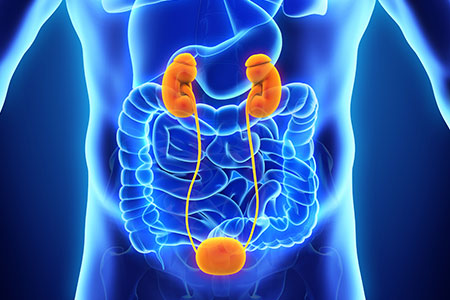Kidneys and Urinary Tract
A Complex System and its Diseases
The kidneys and the urinary tract form a complex, vital organ system, which permanently fulfils a multitude of functions. Each day, approx. 1,800 litres of blood flow through the kidneys and are purified using a very fine filter system, which means that the “toxic” waste accumulating in the body from the metabolic process is filtered out. About 125 ml of primary urine are formed in this way every minute. This corresponds to nearly 180 litres per day. The primary urine contains salts, nutrients, and waste, but no blood cells and no protein.
To perform their task, the kidneys need a sufficient supply of liquid. The daily fluid intake of an adult should under no circumstances fall below 2 litres so as to prevent conditions such as kidney and bladder stones, inflammation and functional restrictions.

Urinary Tract Infections Are More Common in Women
Through various processes of re-resorption, the primary urine is reduced to 1.5 to 2 litres of urine. This flows through the two ureters into the bladder, the storage organ of the urine. From here, arbitrary emptying takes place via the urethra. This is around 20 to 25 centimetres long in men, 4 to 7 centimetres in women.
These anatomical differences in length have an effect on one of the most common diseases of the bladder, cystitis: significantly more women than men are affected by urinary tract infection because the shortness of the female urethra means that germs from the outside can more easily transfer to the bladder. Read more about bladder infections and treatment options here.


